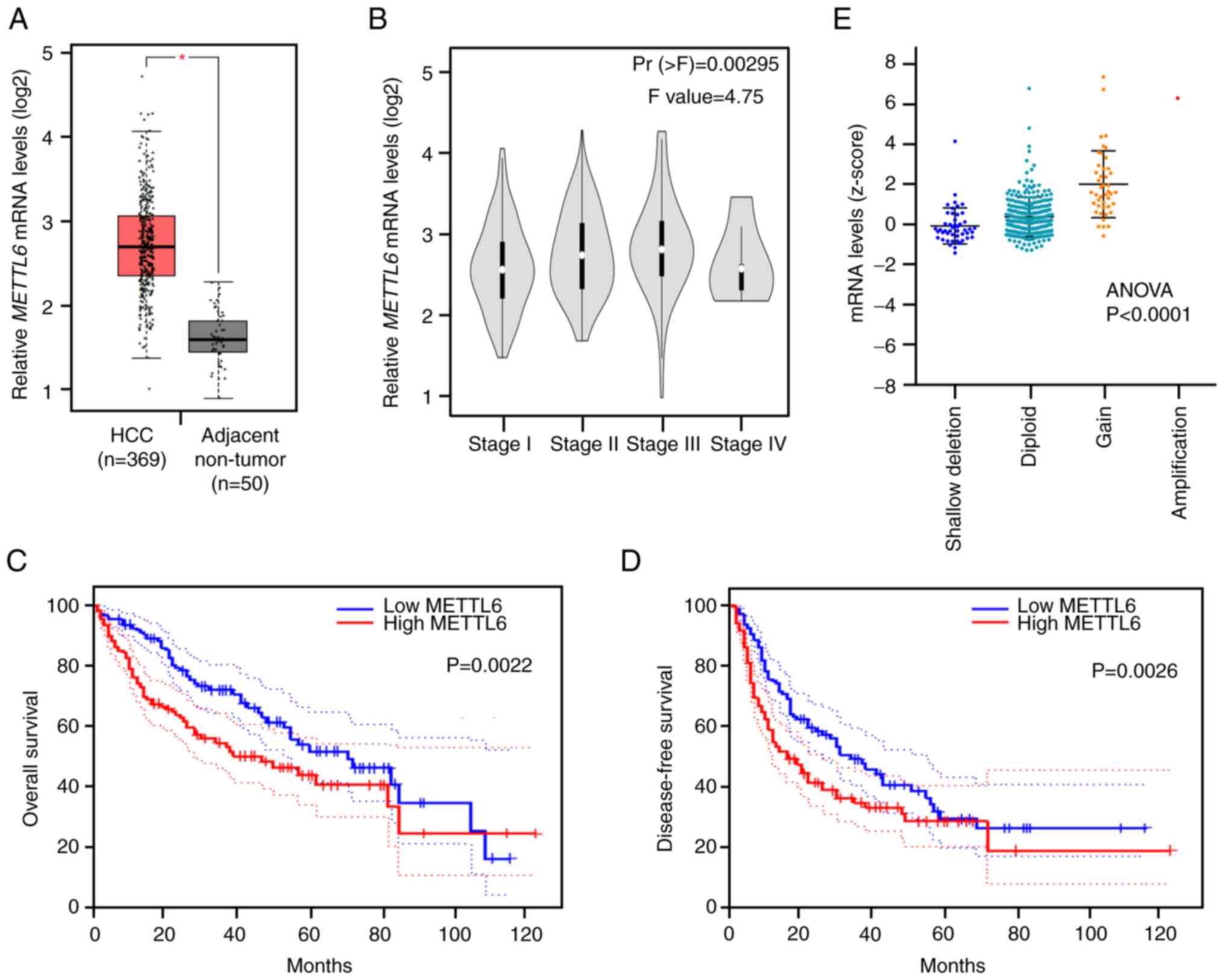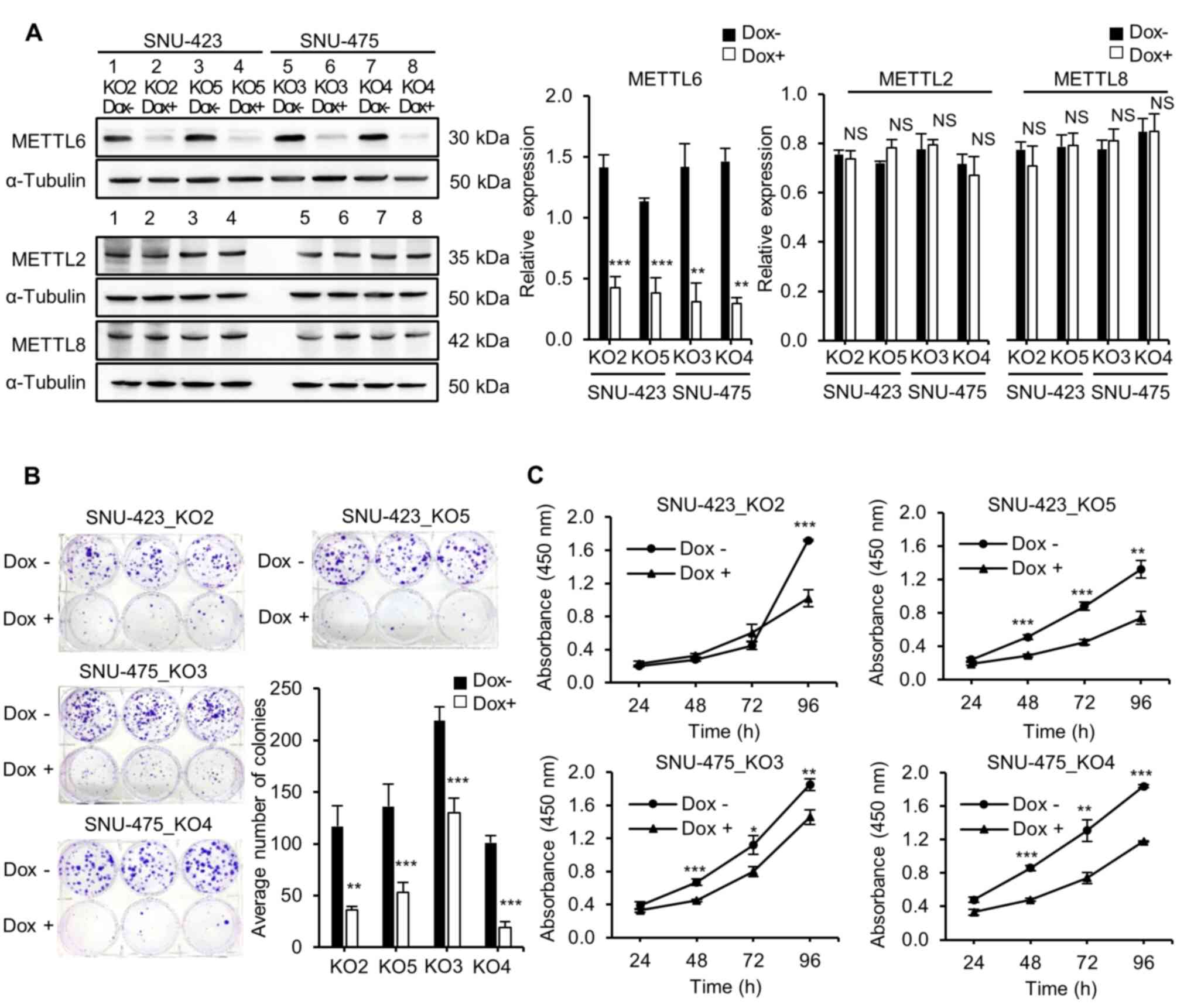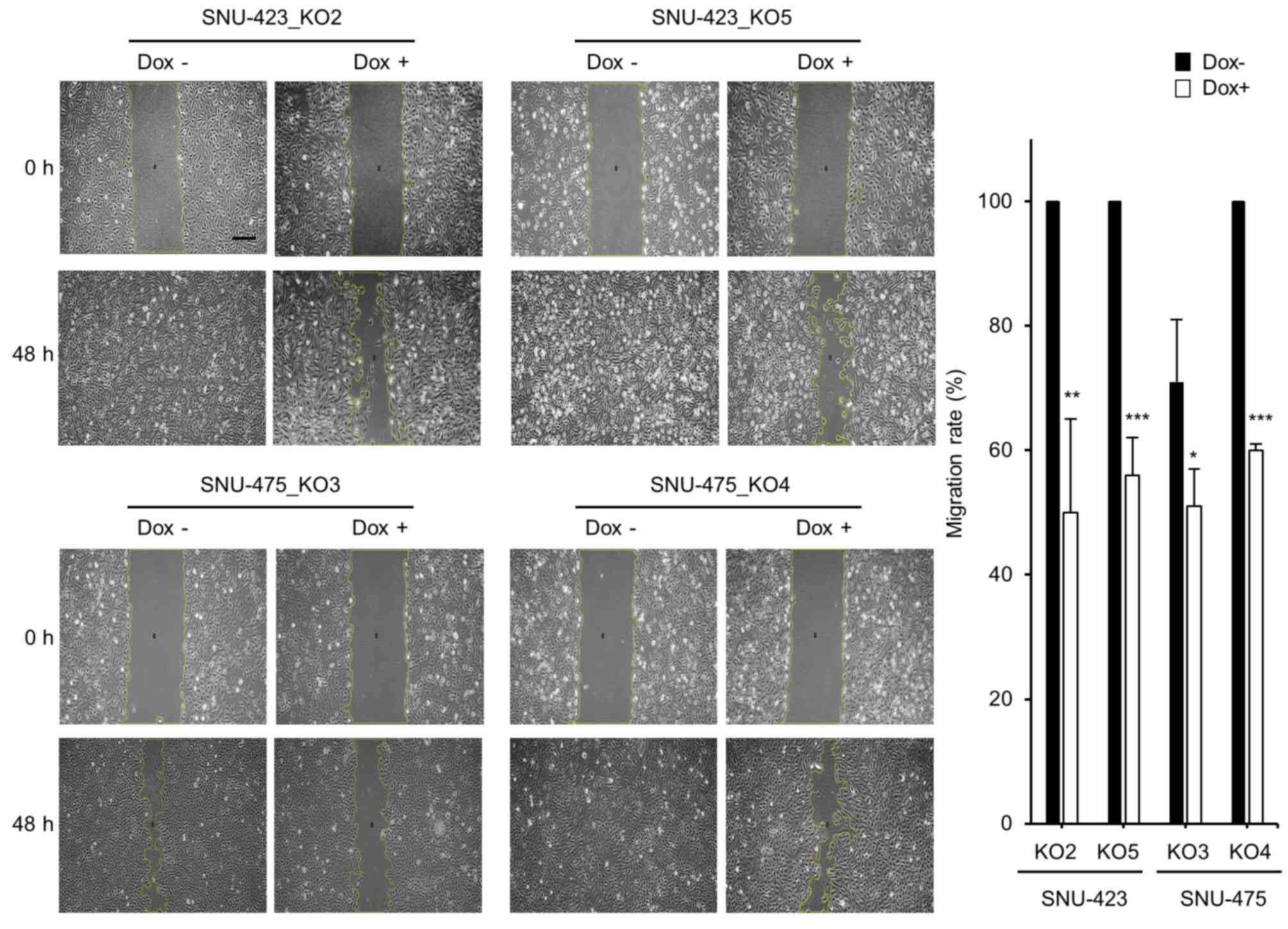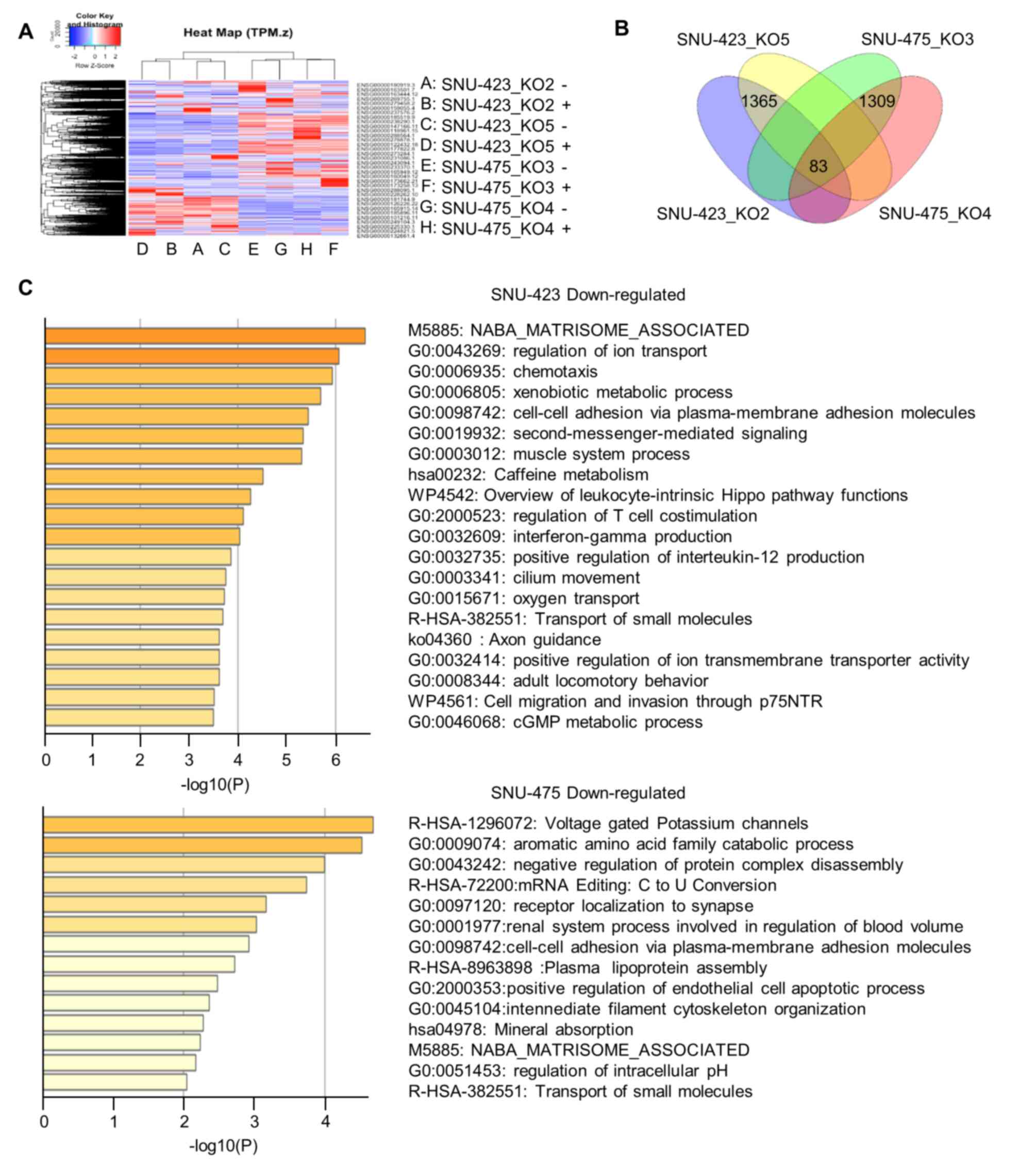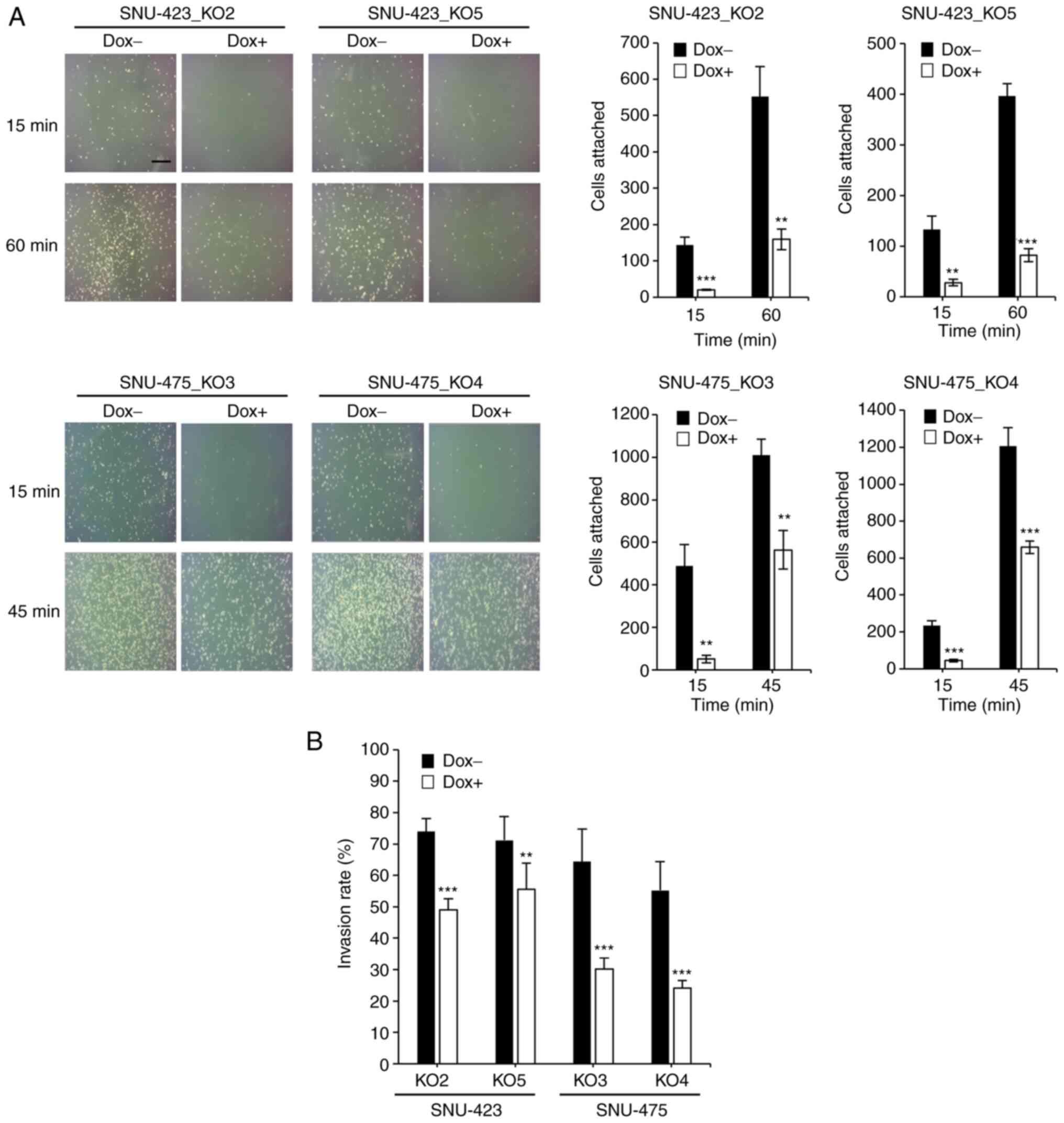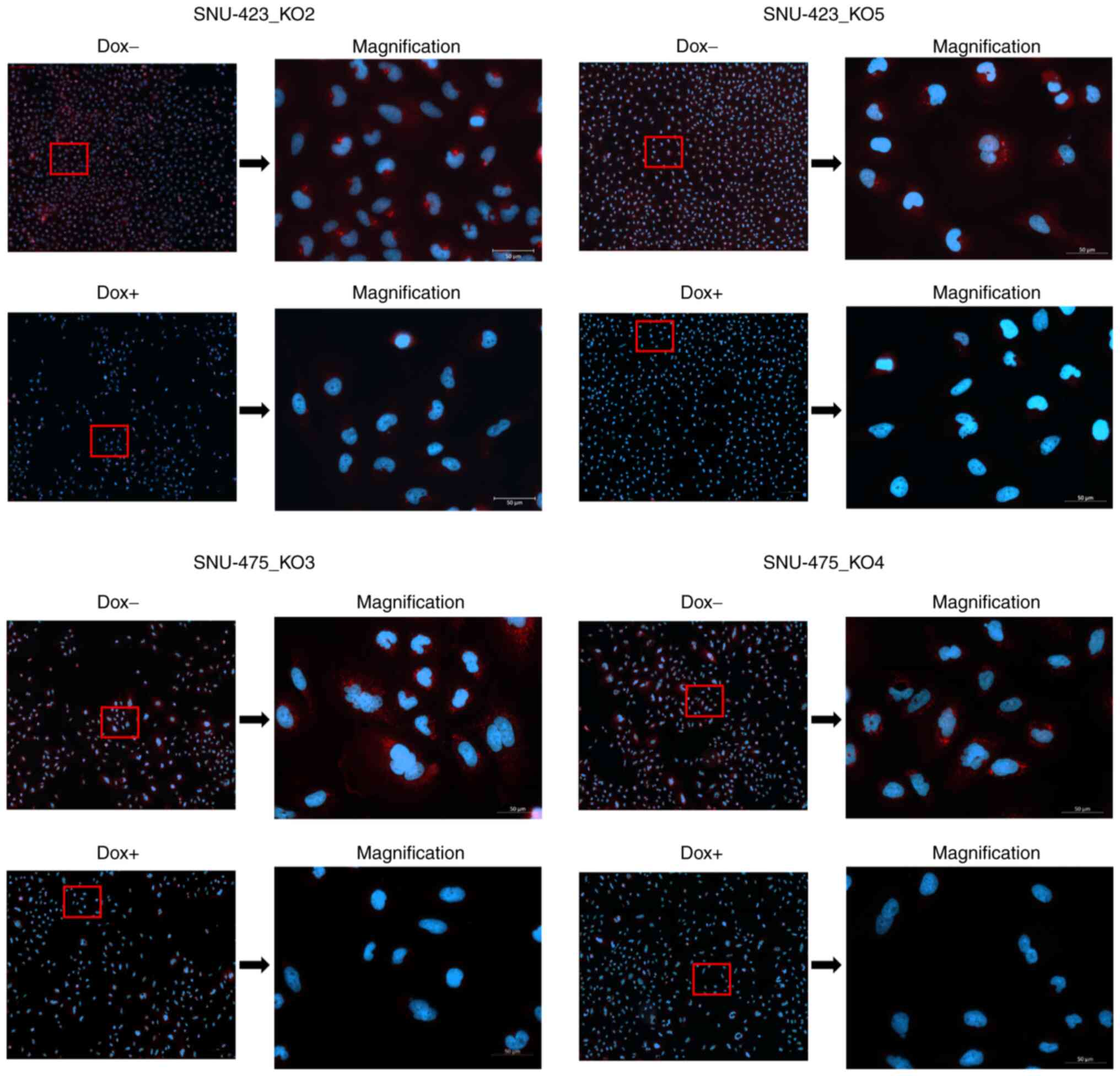|
1
|
Boccaletto P, Machnicka MA, Purta E,
Piatkowski P, Baginski B, Wirecki TK, de Crécy-Lagard V, Ross R,
Limbach PA, Kotter A, et al: MODOMICS: A database of RNA
modification pathways. 2017 update. Nucleic Acids Res.
46:D303–D307. 2018. View Article : Google Scholar :
|
|
2
|
Barbieri I and Kouzarides T: Role of RNA
modifications in cancer. Nat Rev Cancer. 20:303–322. 2020.
View Article : Google Scholar : PubMed/NCBI
|
|
3
|
Delaunay S and Frye M: RNA modifications
regulating cell fate in cancer. Nat Cell Biol. 21:552–559. 2019.
View Article : Google Scholar : PubMed/NCBI
|
|
4
|
Roundtree IA, Evans ME, Pan T and He C:
Dynamic RNA modifications in gene expression regulation. Cell.
169:1187–1200. 2017. View Article : Google Scholar : PubMed/NCBI
|
|
5
|
Asada K, Bolatkan A, Takasawa K, Komatsu
M, Kaneko S and Hamamoto R: Critical Roles of
N6-Methyladenosine (m6A) in cancer and virus
infection. Biomolecules. 10:10712020. View Article : Google Scholar
|
|
6
|
Bray F, Ferlay J, Soerjomataram I, Siegel
RL, Torre LA and Jemal A: Global cancer statistics 2018: GLOBOCAN
estimates of incidence and mortality worldwide for 36 cancers in
185 countries. CA Cancer J Clin. 68:394–424. 2018. View Article : Google Scholar : PubMed/NCBI
|
|
7
|
Herath NI, Leggett BA and MacDonald GA:
Review of genetic and epigenetic alterations in
hepatocarcinogenesis. J Gastroenterol Hepatol. 21:15–21. 2006.
View Article : Google Scholar : PubMed/NCBI
|
|
8
|
Nishida N and Goel A: Genetic and
epigenetic signatures in human hepatocellular carcinoma: A
systematic review. Curr Genomics. 12:130–137. 2011. View Article : Google Scholar : PubMed/NCBI
|
|
9
|
Hamamoto R, Furukawa Y, Morita M, Iimura
Y, Silva FP, Li M, Yagyu R and Nakamura Y: SMYD3 encodes a histone
methyltransferase involved in the proliferation of cancer cells.
Nat Cell Biol. 6:731–740. 2004. View Article : Google Scholar : PubMed/NCBI
|
|
10
|
Yagyu R, Hamamoto R, Furukawa Y, Okabe H,
Yamamura T and Nakamura Y: Isolation and characterization of a
novel human gene, VANGL1, as a therapeutic target for
hepatocellular carcinoma. Int J Oncol. 20:1173–1178.
2002.PubMed/NCBI
|
|
11
|
Shigekawa Y, Hayami S, Ueno M, Miyamoto A,
Suzaki N, Kawai M, Hirono S, Okada KI, Hamamoto R and Yamaue H:
Overexpression of KDM5B/JARID1B is associated with poor prognosis
in hepatocellular carcinoma. Oncotarget. 9:34320–34335. 2018.
View Article : Google Scholar : PubMed/NCBI
|
|
12
|
Ryu JW, Kim SK, Son MY, Jeon SJ, Oh JH,
Lim JH, Cho S, Jung CR, Hamamoto R, Kim DS and Cho HS: Novel
prognostic marker PRMT1 regulates cell growth via downregulation of
CDKN1A in HCC. Oncotarget. 8:115444–115455. 2017. View Article : Google Scholar
|
|
13
|
Chen M, Wei L, Law CT, Tsang FH, Shen J,
Cheng CL, Tsang LH, Ho DW, Chiu DK, Lee JM, et al: RNA
N6-methyladenosine methyltransferase-like 3 promotes liver cancer
progression through YTHDF2-dependent posttranscriptional silencing
of SOCS2. Hepatology. 67:2254–2270. 2018. View Article : Google Scholar
|
|
14
|
Barbieri I, Tzelepis K, Pandolfini L, Shi
J, Millán-Zambrano G, Robson SC, Aspris D, Migliori V, Bannister
AJ, Han N, et al: Promoter-bound METTL3 maintains myeloid leukaemia
by m6A-dependent translation control. Nature.
552:126–131. 2017. View Article : Google Scholar : PubMed/NCBI
|
|
15
|
Ma JZ, Yang F, Zhou CC, Liu F, Yuan JH,
Wang F, Wang TT, Xu QG, Zhou WP and Sun SH: METTL14 suppresses the
metastatic potential of hepatocellular carcinoma by modulating
N6-methyladenosine-dependent primary MicroRNA
processing. Hepatology. 65:529–543. 2017. View Article : Google Scholar
|
|
16
|
Bao J, Yu Y, Chen J, He Y, Chen X, Ren Z,
Xue C, Liu L, Hu Q, Li J, et al: MiR-126 negatively regulates PLK-4
to impact the development of hepatocellular carcinoma via ATR/CHEK1
pathway. Cell Death Dis. 9:10452018. View Article : Google Scholar : PubMed/NCBI
|
|
17
|
Zhong L, Liao D, Zhang M, Zeng C, Li X,
Zhang R, Ma H and Kang T: YTHDF2 suppresses cell proliferation and
growth via destabilizing the EGFR mRNA in hepatocellular carcinoma.
Cancer Lett. 442:252–261. 2019. View Article : Google Scholar
|
|
18
|
Gatza ML, Silva GO, Parker JS, Fan C and
Perou CM: An integrated genomics approach identifies drivers of
proliferation in luminal-subtype human breast cancer. Nat Genet.
46:1051–1059. 2014. View Article : Google Scholar : PubMed/NCBI
|
|
19
|
Tan XL, Moyer AM, Fridley BL, Schaid DJ,
Niu N, Batzler AJ, Jenkins GD, Abo RP, Li L, Cunningham JM, et al:
Genetic variation predicting cisplatin cytotoxicity associated with
overall survival in lung cancer patients receiving platinum-based
chemotherapy. Clin Cancer Res. 17:5801–5811. 2011. View Article : Google Scholar : PubMed/NCBI
|
|
20
|
Ignatova VV, Kaiser S, Ho JS, Bing X,
Stolz P, Tan YX, Lee CL, Gay FP, Lastres PR, Gerlini R, et al:
METTL6 is a tRNA m3C methyltransferase that regulates
pluripotency and tumor cell growth. Sci Adv. 6:eaaz45512020.
View Article : Google Scholar
|
|
21
|
Dai X, Jiang W, Ma L, Sun J, Yan X, Qian
J, Wang Y, Shi Y, Ni S and Yao N: A metabolism-related gene
signature for predicting the prognosis and therapeutic responses in
patients with hepatocellular carcinoma. Ann Transl Med. 9:5002021.
View Article : Google Scholar : PubMed/NCBI
|
|
22
|
Lopez-Terrada D, Cheung SW, Finegold MJ
and Knowles BB: Hep G2 is a hepatoblastoma-derived cell line. Hum
Pathol. 40:1512–1515. 2009. View Article : Google Scholar : PubMed/NCBI
|
|
23
|
Nakabayashi H and Taketa K: HuH-7 cell
line established from a highly differentiated human hepatocellular
carcinoma. Okayama Igakkai Zasshi (Journal of Okayama Medical
Association). 124:231–238. 2012. View Article : Google Scholar
|
|
24
|
Yamada T, Abei M, Danjoh I, Shirota R,
Yamashita T, Hyodo I and Nakamura Y: Identification of a unique
hepatocellular carcinoma line, Li-7, with CD13(+) cancer stem cells
hierarchy and population change upon its differentiation during
culture and effects of sorafenib. BMC Cancer. 15:2602015.
View Article : Google Scholar : PubMed/NCBI
|
|
25
|
Kim S, Bolatkan A, Kaneko S, Ikawa N,
Asada K, Komatsu M, Hayami S, Ojima H, Abe N, Yamaue H and Hamamoto
R: Deregulation of the histone lysine-specific demethylase 1 is
involved in human hepatocellular carcinoma. Biomolecules.
9:8102019. View Article : Google Scholar
|
|
26
|
Schneider CA, Rasband WS and Eliceiri KW:
NIH Image to ImageJ: 25 years of image analysis. Nat Methods.
9:671–675. 2012. View Article : Google Scholar : PubMed/NCBI
|
|
27
|
Zhou Y, Zhou B, Pache L, Chang M,
Khodabakhshi AH, Tanaseichuk O, Benner C and Chanda SK: Metascape
provides a biologist-oriented resource for the analysis of
systems-level datasets. Nat Commun. 10:15232019. View Article : Google Scholar : PubMed/NCBI
|
|
28
|
Ozawa T, Kaneko S, Szulzewsky F, Qiao Z,
Takadera M, Narita Y, Kondo T, Holland EC, Hamamoto R and Ichimura
K: C11orf95-RELA fusion drives aberrant gene expression through the
unique epigenetic regulation for ependymoma formation. Acta
Neuropathol Commun. 9:362021. View Article : Google Scholar : PubMed/NCBI
|
|
29
|
Langmead B and Salzberg SL: Fast
gapped-read alignment with Bowtie 2. Nat Methods. 9:357–359. 2012.
View Article : Google Scholar : PubMed/NCBI
|
|
30
|
Robinson JT, Thorvaldsdottir H, Winckler
W, Guttman M, Lander ES, Getz G and Mesirov JP: Integrative
genomics viewer. Nat Biotechnol. 29:24–26. 2011. View Article : Google Scholar : PubMed/NCBI
|
|
31
|
Tang Z, Li C, Kang B, Gao G, Li C and
Zhang Z: GEPIA: A web server for cancer and normal gene expression
profiling and interactive analyses. Nucleic Acids Res. 45:W98–W102.
2017. View Article : Google Scholar : PubMed/NCBI
|
|
32
|
Anaya J: OncoLnc: Linking TCGA survival
data to mRNAs, miRNAs, and lncRNAs. PeerJ Computer Science.
2:e672016. View Article : Google Scholar
|
|
33
|
Xu L, Liu X, Sheng N, Oo KS, Liang J,
Chionh YH, Xu J, Ye F, Gao YG, Dedon PC and Fu XY: Three distinct
3-methylcytidine (m3C) methyltransferases modify tRNA
and mRNA in mice and humans. J Biol Chem. 292:14695–14703. 2017.
View Article : Google Scholar : PubMed/NCBI
|
|
34
|
Richon VM, Johnston D, Sneeringer CJ, Jin
L, Majer CR, Elliston K, Jerva LF, Scott MP and Copeland RA:
Chemogenetic analysis of human protein methyltransferases. Chem
Biol Drug Des. 78:199–210. 2011. View Article : Google Scholar : PubMed/NCBI
|
|
35
|
Leitinger B and Hohenester E: Mammalian
collagen receptors. Matrix Biol. 26:146–155. 2007. View Article : Google Scholar
|
|
36
|
Wilcox ER, Burton QL, Naz S, Riazuddin S,
Smith TN, Ploplis B, Belyantseva I, Ben-Yosef T, Liburd NA, Morell
RJ, et al: Mutations in the gene encoding tight junction claudin-14
cause autosomal recessive deafness DFNB29. Cell. 104:165–172. 2001.
View Article : Google Scholar : PubMed/NCBI
|
|
37
|
Klar A, Baldassare M and Jessell TM:
F-spondin: A gene expressed at high levels in the floor plate
encodes a secreted protein that promotes neural cell adhesion and
neurite extension. Cell. 69:95–110. 1992. View Article : Google Scholar : PubMed/NCBI
|
|
38
|
Liu X, Tian H, Li H, Ge C, Zhao F, Yao M
and Li J: Derivate Isocorydine (d-ICD) suppresses migration and
invasion of hepatocellular carcinoma cell by downregulating ITGA1
expression. Int J Mol Sci. 18:5142017. View Article : Google Scholar :
|
|
39
|
Dai W, Huang HL, Hu M, Wang SJ, He HJ,
Chen NP and Li MY: microRNA-506 regulates proliferation, migration
and invasion in hepatocellular carcinoma by targeting F-spondin 1
(SPON1). Am J Cancer Res. 5:2697–2707. 2015.PubMed/NCBI
|
|
40
|
Li CP, Cai MY, Jiang LJ, Mai SJ, Chen JW,
Wang FW, Liao YJ, Chen WH, Jin XH, Pei XQ, et al: CLDN14 is
epigenetically silenced by EZH2-mediated H3K27ME3 and is a novel
prognostic biomarker in hepatocellular carcinoma. Carcinogenesis.
37:557–566. 2016. View Article : Google Scholar : PubMed/NCBI
|
|
41
|
Arimbasseri AG, Iben J, Wei FY, Rijal K,
Tomizawa K, Hafner M and Maraia RJ: Evolving specificity of tRNA
3-methyl-cytidine-32 (m3C32) modification: A subset of tRNAsSer
requires N6-isopentenylation of A37. RNA. 22:1400–1410. 2016.
View Article : Google Scholar : PubMed/NCBI
|
|
42
|
Hopper AK and Huang HY: Quality control
pathways for nucleus-encoded eukaryotic tRNA biosynthesis and
subcellular trafficking. Mol Cell Biol. 35:2052–2058. 2015.
View Article : Google Scholar : PubMed/NCBI
|
|
43
|
Zhang Z, Ye Y, Gong J, Ruan H, Liu CJ,
Xiang Y, Cai C, Guo AY, Ling J and Diao L: Global analysis of tRNA
and translation factor expression reveals a dynamic landscape of
translational regulation in human cancers. Commun Biol. 1:2342018.
View Article : Google Scholar : PubMed/NCBI
|
|
44
|
Santos M, Fidalgo A, Varanda AS, Oliveira
C and Santos MA: tRNA deregulation and its consequences in cancer.
Trends Mol Med. 25:853–865. 2019. View Article : Google Scholar : PubMed/NCBI
|
|
45
|
Huang H, Weng H, Zhou K, Wu T, Zhao BS,
Sun M, Chen Z, Deng X, Xiao G, Auer F, et al: Histone H3
trimethylation at lysine 36 guides m6A RNA modification
co-transcriptionally. Nature. 567:414–419. 2019. View Article : Google Scholar : PubMed/NCBI
|
|
46
|
Li Y, Xia L, Tan K, Ye X, Zuo Z, Li M,
Xiao R, Wang Z, Liu X, Deng M, et al: N6-Methyladenosine
co-transcriptionally directs the demethylation of histone H3K9me2.
Nat Genet. 52:870–877. 2020. View Article : Google Scholar : PubMed/NCBI
|
|
47
|
Cheng JX, Chen L, Li Y, Cloe A, Yue M, Wei
J, Watanabe KA, Shammo JM, Anastasi J, Shen QJ, et al: RNA cytosine
methylation and methyltransferases mediate chromatin organization
and 5-azacytidine response and resistance in leukaemia. Nat Commun.
9:11632018. View Article : Google Scholar : PubMed/NCBI
|
|
48
|
Pereira M, Francisco S, Varanda AS, Santos
M, Santos MA and Soares AR: Impact of tRNA Modifications and
tRNA-modifying enzymes on proteostasis and human disease. Int J Mol
Sci. 19:37382018. View Article : Google Scholar
|
|
49
|
Hoffer ED, Hong S, Sunita S, Maehigashi T,
Gonzalez RL Jnr, Whitford PC and Dunham CM: Structural insights
into mRNA reading frame regulation by tRNA modification and
slippery codon-anticodon pairing. Elife. 9:e518982020. View Article : Google Scholar : PubMed/NCBI
|
|
50
|
McLaughlin CS, Grundberg-Manago M, Dondon
J, Michelson AM and Saunders G: Stability of the messenger
RNA-transfer RNA-ribosome complex. J Mol Biol. 32:521–542. 1968.
View Article : Google Scholar : PubMed/NCBI
|
|
51
|
Alexandrov A, Chernyakov I, Gu W, Hiley
SL, Hughes TR, Grayhack EJ and Phizicky EM: Rapid tRNA decay can
result from lack of nonessential modifications. Mol Cell. 21:87–96.
2006. View Article : Google Scholar : PubMed/NCBI
|
|
52
|
Carneiro RL, Requiao RD, Rossetto S,
Domitrovic T and Palhano FL: Codon stabilization coefficient as a
metric to gain insights into mRNA stability and codon bias and
their relationships with translation. Nucleic Acids Res.
47:2216–2228. 2019. View Article : Google Scholar : PubMed/NCBI
|
|
53
|
Wu Q, Medina SG, Kushawah G, DeVore ML,
Castellano LA, Hand JM, Wright M and Bazzini AA: Translation
affects mRNA stability in a codon-dependent manner in human cells.
Elife. 8:e453962019. View Article : Google Scholar : PubMed/NCBI
|
|
54
|
Lyu X, Yang Q, Li L, Dang Y, Zhou Z, Chen
S and Liu Y: Adaptation of codon usage to tRNA I34 modification
controls translation kinetics and proteome landscape. PLoS Genet.
16:e10088362020. View Article : Google Scholar : PubMed/NCBI
|
|
55
|
Motorin Y and Helm M: tRNA stabilization
by modified nucleotides. Biochemistry. 49:4934–4944. 2010.
View Article : Google Scholar : PubMed/NCBI
|
|
56
|
Kimura S and Waldor MK: The RNA
degradosome promotes tRNA quality control through clearance of
hypomodified tRNA. Proc Natl Acad Sci USA. 116:1394–1403. 2019.
View Article : Google Scholar : PubMed/NCBI
|
|
57
|
Schimmel P: The emerging complexity of the
tRNA world: Mammalian tRNAs beyond protein synthesis. Nat Rev Mol
Cell Biol. 19:45–58. 2018. View Article : Google Scholar
|
|
58
|
Xie Y, Yao L, Yu X, Ruan Y, Li Z and Guo
J: Action mechanisms and research methods of tRNA-derived small
RNAs. Signal Transduct Target Ther. 5:1092020. View Article : Google Scholar : PubMed/NCBI
|
|
59
|
Lyons SM, Fay MM and Ivanov P: The role of
RNA modifications in the regulation of tRNA cleavage. FEBS Lett.
592:2828–2844. 2018. View Article : Google Scholar : PubMed/NCBI
|
|
60
|
Kim HK, Fuchs G, Wang S, Wei W, Zhang Y,
Park H, Roy-Chaudhuri B, Li P, Xu J, Chu K, et al: A
transfer-RNA-derived small RNA regulates ribosome biogenesis.
Nature. 552:57–62. 2017. View Article : Google Scholar : PubMed/NCBI
|
|
61
|
Wan J, Wen D, Dong L, Tang J, Liu D, Liu
Y, Tao Z, Gao D, Sun H, Cao Y, et al: Establishment of monoclonal
HCC cell lines with organ site-specific tropisms. BMC Cancer.
15:6782015. View Article : Google Scholar : PubMed/NCBI
|
|
62
|
Gharibi A, La Kim S, Molnar J, Brambilla
D, Adamian Y, Hoover M, Hong J, Lin J, Wolfenden L and Kelber JA:
ITGA1 is a pre-malignant biomarker that promotes therapy resistance
and metastatic potential in pancreatic cancer. Sci Rep.
7:100602017. View Article : Google Scholar : PubMed/NCBI
|
|
63
|
Li H, Wang Y, Rong SK, Li L, Chen T, Fan
YY, Wang YF, Yang CR, Yang C, Cho WC and Yang J: Integrin α1
promotes tumorigenicity and progressive capacity of colorectal
cancer. Int J Biol Sci. 16:815–826. 2020. View Article : Google Scholar :
|
|
64
|
Tryndyak VP, Borowa-Mazgaj B, Steward CR,
Beland FA and Pogribny IP: Epigenetic effects of low-level sodium
arsenite exposure on human liver HepaRG cells. Arch Toxicol.
94:3993–4005. 2020. View Article : Google Scholar : PubMed/NCBI
|
|
65
|
Cheng J, Han J and Lin C: A comprehensive
assessment of the prognostic role of cell adhesion molecules in
acute myeloid leukemia. Transl Cancer Res. 9:7605–7618. 2020.
View Article : Google Scholar
|
|
66
|
Yang G, Jian L and Chen Q: Comprehensive
analysis of expression and prognostic value of the claudin family
in human breast cancer. Aging (Albany NY). 13:8777–8796. 2021.
View Article : Google Scholar
|















